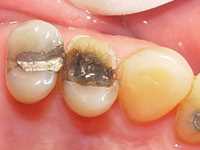Services for Cracked Tooth Syndrome
 You may have a very commonly occurring dental problem.
You may have a very commonly occurring dental problem.
Teeth may crack when subjected to the stress of chewing hard foods, ice, or hard objects. Teeth with or without restorations (fillings) may exhibit this problem, but teeth restored with typical silver alloy or tooth-colored restorations are most susceptible. Older persons have more cracked teeth than younger people.
Symptoms and signs include the following:
- Pain on chewing.
- Pain on cold-air application.
- Unsolicited pain (This is usually leakage of sugar into the tooth cracks).
- No x-ray evidence of the problem.
- Dental decay is not present.
- Easy verification of the crack by the dentist when the tooth is prepared for restoration.
Treatment of Cracked Teeth:
- Simple Crack: The majority of cracked teeth (about 9 our of 10) can be treated by placement of a simple crown (cap) on the tooth. When the tooth is prepared for the crown and a temporary restoration is placed, the pain usually leaves immediately. If this is the case with your tooth, we will place the final crown without a problem on your next appointment. The condition should then be solved.
- Complex Crack: Occasionally, (about 1 in 10) the tooth cracks into the pulp (nerve) of the tooth. If pain persists after placement of the temporary crown, you may have a crack into the pulp of the affected tooth. Please call us. This tooth may require endodontics (root canal therapy) before the crown is placed. This procedure requires about two additional appointments before the crown is placed.
- Tooth Cracked in Half: Occasionally a tooth cracks into two separate pieces. This usually requires removal of the entire tooth and subsequent rehabilitation with an implant/crown or a dental bridge.